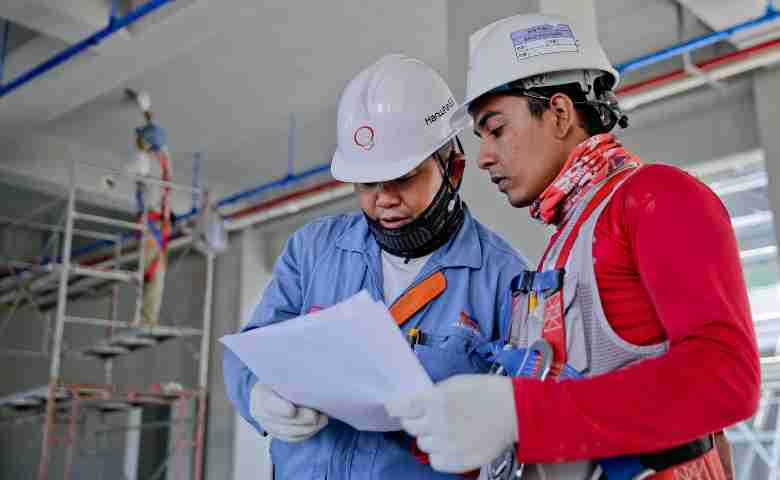Last Updated on August 29, 2024 by Admin
Innovative technologies and practices will redefine how sites ensure worker safety in 2024. Consider the integration of tech-savvy tools, which create environments where risks are significantly reduced. AI, automation, and IoT are transforming operations in ways we only imagined a few years back.
It is all about enhancing real-time monitoring and predictive analytics. Stay with us to discover how construction sites evolve to meet modern safety standards head-on.
Table of Contents
Smart Helmets
Smart helmets are changing the landscape of construction site safety. Equipped with sensors, these advanced helmets monitor vital signs and environmental conditions and notify wearers in real-time.
This technology empowers teams to react quickly to risks, reducing accidents and enhancing overall safety. Industry experts believe smart helmets will become essential gear on modern construction sites, pushing safety standards to new heights.
Drones in Construction
In addition to smart helmets, drones are revolutionizing construction site safety. These flying devices offer a bird’s-eye view, allowing for efficient site inspections and monitoring of hazardous areas without risking human life.
Equipped with high-resolution cameras and sensors, drones can detect potential issues like structural weaknesses or unauthorized personnel on-site. Their ability to provide real-time data helps project managers make informed decisions quickly, enhancing overall safety protocols.m
Wearable Sensors
Wearable Technology is also transforming construction site safety. Devices such as smart vests and gloves monitor workers’ physical conditions, such as heart rate, body temperature, and other vital signs.
They provide alerts when thresholds are crossed, allowing timely interventions to prevent health issues. Beyond monitoring, wearable technology offers location tracking for swift emergency response if an accident occurs.
IoT-Enabled Equipment
While wearable sensors enhance safety, IoT-enabled equipment brings another layer of innovation to construction sites. It involves the use of machines and tools connected to the Internet of Things, which communicate status and performance in real-time.
They alert operators about maintenance needs or potential malfunctions before they lead to dangerous situations. This proactive approach minimizes downtime and reduces the likelihood of accidents caused by equipment failure.
Automation and Robotics
Automation and robotics are critical to redefining safety on construction sites. Automated machinery can handle tasks like lifting heavy materials or operating in hazardous environments, reducing human exposure to risks.
Many of these machines are powered by a TEFC motor for heavy-duty use, ensuring reliability in rugged conditions. These advanced systems also contribute to more efficient workflows while maintaining stringent safety standards.
Predictive Analytics
Last but certainly not least, predictive analytics is becoming a game-changer in construction site safety. This approach utilizes data from various sources, including past incidents and environmental factors, to forecast potential risks.
Advanced algorithms analyze patterns and trends, providing actionable insights to prevent accidents before they happen. Predictive analytics not only reduces the likelihood of mishaps but also streamlines operations by optimizing resource allocation.
Final Words
The future of construction site safety is bright, with innovative technologies and practices leading the charge. These advancements are not only protecting workers but also improving efficiency and productivity.
Staying informed about these developments ensures that you remain ahead in this evolving industry landscape.
Related Posts:
- Safety Helmet vs. Hard Hat: Understanding the Key Differences and Making the Right Choice
- Top 15 Safety Protocols Every Construction Site Must Follow
- Harnessing the Power of Data: Revolutionizing the Construction Industry
- How Artificial Intelligence Is Changing the Way We Work in Oil & Gas


